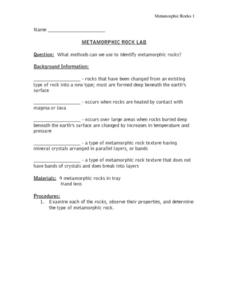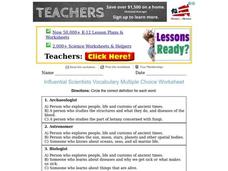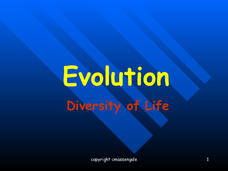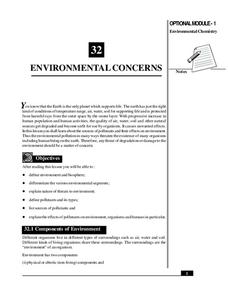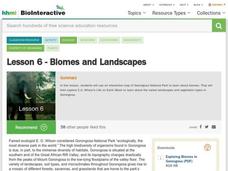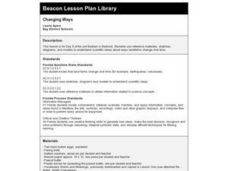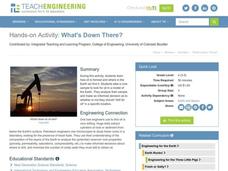Curated OER
Albedo and Irradiation of Surfaces
Here is a physical science activity where pupils place thermometers inside of a white and a black paper pocket and place them under a lamp. They record and compare the temperature increase over a ten-minute period. Have your class...
Curated OER
Changes Written in Stone
Earth Rocks! Explore the many properties and types of rocks, where they come from and how they are formed. This resource presents a simplistic overview of the rock cycle. Tip: Bring in samples of sedimentary, metamorphic, and igneous...
Curated OER
Soil Porosity, Moisture Content, pH, and Density
This lab activity does not have to be done with AP environmental scientists. It can also be done with middle to high school earth scientists. The procedures aren't complex. Learners determine the density of dry and wet sand in order to...
Curated OER
Gingerbread Spacecraft
Students explore the different parts of the Cassini spacecraft. In this space science lesson, students create a model of the spacecraft using food products. They compare and contrast their model with the real one and evaluate its...
Curated OER
Investigating Properties of Water: Temperature
Investigate how temperature affects the density of water and stratification that occurs in bodies of water when temperatures vary. Water of differing temperatures is given different colors to see the layers that form. The lesson plan is...
Curated OER
Ocean Streams
The instructions for demonstrating ocean turnover are provided in this resource. You could set this up for your earth science class as part of a lecture on convection currents or as an explanation of how ocean currents form. An animation...
Curated OER
Frogs Frogs Frogs
Young scholars view a disk on the continental movement and analyze the given data on fossils, rock types and climate zones. In this geology lesson plan students draw a diagram of the earths layers, take a quiz complete a PowerPoint...
Curated OER
Fossil Formation
Young scholars discuss fossils. In this science lesson, students simulate fossils within Earth's layers by using gummy fish and bread.
Curated OER
Interior of the Earth
Sixth graders identify and describe the composition and physical properties of the layers of the Earth. They also explain how scientists used the scientific process to know about the center of the Earth. Finally, 6th graders read a...
Curated OER
Metamorphic Rock Lab
In this metamorphic rock worksheet, learners observe 9 metamorphic rock samples and indicate the grain size, if there are bands, if there are layers , if it is foliated and they identify the name of the rock. They complete 5 sentences...
Curated OER
Influential Scientists Vocabulary Quiz
In this science vocabulary worksheet, students match the names of 19 science professionals with the definition. Example: Ichthyologist (studies fish).
Curated OER
Influential Scientists Vocabulary Multiple Choice Worksheet
In this science vocabulary worksheet, students read the names of science professionals. From three choices, students choose the correct definition for each word.
Curated OER
Types of Faults
This set of black-line diagrams of the three different types of faults can be used with your upper elementary earth scientists. Simply have them color the layers to show where the land once lined up. Another use for this resource would...
Curated OER
Plate Tectonics: Third Grade Lesson Plans and Activities
Third graders examine plate movements and boundaries with a lab that demonstrates how volcanoes and earthquakes are formed. It presents different types of stresses an object can withstand through a hands-on experiment with clay to...
Wilderness Classroom
Ocean Life
Our oceans are composed of many complex relationships. Young oceanographers explore relationships between organisms, understand the world ocean's currents, and discover the effects of water pollution and how it behaves. There are three...
Curated OER
Layer By Layer
Have your class learn about the formation of the Grand Canyon using this lesson. After listening to a variety of stories about the Grand Canyon and erosion, learners complete worksheets related to the geology of this area. What a...
Biology Junction
Evolution – Diversity of Life
Scientists noticed animals with backbones share similar bone structure despite having different forms, such as fins, arms, and wings. Young scientists gain an appreciation for evolution by understanding the history of the theory. They...
National Institute of Open Schooling
Environmental Concerns
Every year, more than 14 billion pounds of garbage is dumped into the oceans of the world, most of which is plastic and toxic to ocean life. Lesson 32 in the series of 36 focuses on environmental concerns, specifically pollution. Under...
Howard Hughes Medical Institute
Lesson 6: Biomes and Landscapes
Aside from the amazing animals in Gorongosa National Park, what else is there to discover? The sixth installment in an eight-part themed series contains an interactive map where scholars can learn more about the geographic features of...
Howard Hughes Medical Institute
Winogradsky Columns: Microbial Ecology in the Classroom
Winogradsky columns are ideal for observing the role of bacteria and other microorganisms in an ecosystem. This student activity guide is complete with data tables for observations and analysis questions for processing what was observed....
Curated OER
Earth's Plate Tectonics
Students identify the different layers of the Earth. In this earth science lesson plan, students create a model of the crusts and continents. They explain how plates movement cause earthquakes and volcanoes.
Curated OER
Changing Ways
Third graders examine hard boiled eggs as possible models for the earth's layers.
Curated OER
Its Getting Thinner and Thinner
Learners design posters on the ozone to be judged. They design a board game on the depletion of the ozone and list the layers of the atmosphere. They construct a collage of the atmosphere into layers according to the way temperature...
Curated OER
What's down there?
students analyze how oil is formed and where in the Earth we find it. Students take a core sample to look for oil in a model of the Earth. They analyze their sample and make an informed decision as to whether or not they should "drill...











